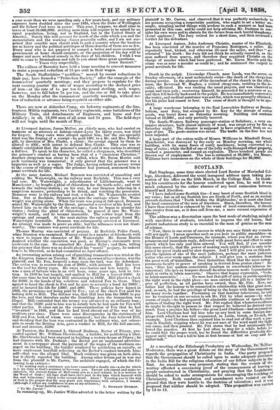SCOTLAND.
Earl Stanhope, some time since elected Lord Rector of Marischal Col- lege? Aberdeen, delivered the usual inaugural address upon taking pos- session of his office on the 25th March, in the College Hall. In thank- ing his constituents for the honour conferred upon him, he said it was much enhanced by the entire absence of any local connexion between himself and Aberdeen.
"I have indeed some Scottish ties—I may boast of some Scottish blood in my veins ; but as all my Scottish ties are South of Forth, and as an ancient proverb declares that Forth bridles the Highlander,' so it must also limit the local connexions of the men of Aberdeen. Since, therefore, the honour I have thus received is enhanced by the want of local connexion, it should also receive from me, as it does call from me, a more earnest expression of thanks."
The address was a dissertation upon the best mode of studying, mingled with anecdotes of students, intended to impress the old lesson that patient industrious study is as essential to the man of genius as the man of science.
"Now, there is one scene of success to which you may think my remarks will not apply. I mean speeches such as you hear in public assemblies—in the Houses of Lords and Commons, for example, where you find an extem- poraneous and immediate reply, delivered with great force and effect to some speech which has only just been uttered. You will find, if you consider this more closely, that the power of making such quick replies is only to be gained by great study and by slow degrees. And I will give you on this sub- ject the opinion of one of the most judicions, perhaps the most judicious writer who ever wrote upon the subject. I will give you a sentence from the great work of Quintilian. Does Quintilian- think that the mere extem- poraneous faculty or power of epeakin„a is derived from genius alone? He says, Sine hae quidem corismentia (multum in rescribendo laborem in- sumpsisse) ills ipsa ex tempore dicendi facultas inanem modo loquacitatem dabit et verbs in labris nascentia.' Observe that happy expression, 4 Verba in labris nascentia.' . . . . No man had that gift of using in public speaking the right word in the right place—no man carried that gift to a higher de- gree of perfection, as all parties have owned, than Mr. Pitt. Now, my father had the honour to be connected in relationship with that great man, and, as such, he had the privilege of being in the house with him sometimes for many weeks together. Presuming on that familiar intercourse, he told me he ventured on one occasion to ask Mr. Pitt by what means—by what course of study—he had acquired that admirable readiness of speech—that aptness of finding the right word. Mr. Pitt replied that whatever readiness he might be thought to possess in that respect he believed he derived very much from a practice Ins father—the great Lord Chatham—had enjoined on him. Lord Chatham had bid him take up any book in some foreign lan- guage with which he was well acquainted, in Latin, Greek, or French, for example. Lord Chatham then enjoined him to read out of this work a pas- sage in English, stopping where he was not sure of the word' until the right one came, and then pioceed. Mr. Pitt states that he had assiduously fol- lowed the practice. At first he had often to stop for a while before he he could find the proper word, but he found the difficulties gradually dis- appear until what was a toil to him at first became at last an easy and milisrtask."k."
At a meeting of the Edinburgh Presbytery on Wednesday, Dr. Balfour Moderator, there was a great debate on the duty of the Governritent as regards the propagation of Christianity in India. One party proposed that the Government should be called upon to snake adequate provision in the India Bill for the religious education of our fellow subjects in the East. An amendment was proposed, stating that the events of the mutiny afforded a convincing proof of the consequences of leaving a people uninstructed in Christianity, and praying that the Legislature should be asked to make arrangements for encouraging the teaching of Christianity. Both resolution and amendment were resisted on the ground that they were hostile to tho doctrine of toleration ; and it was proposed that neither should be adopted. ' This propoldtion was carried by 13 to 12.


































 Previous page
Previous page